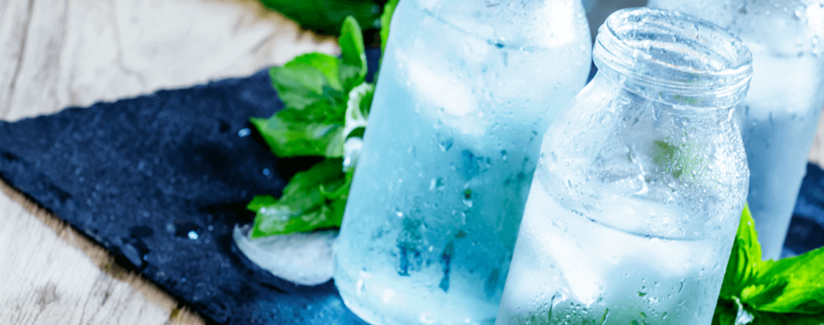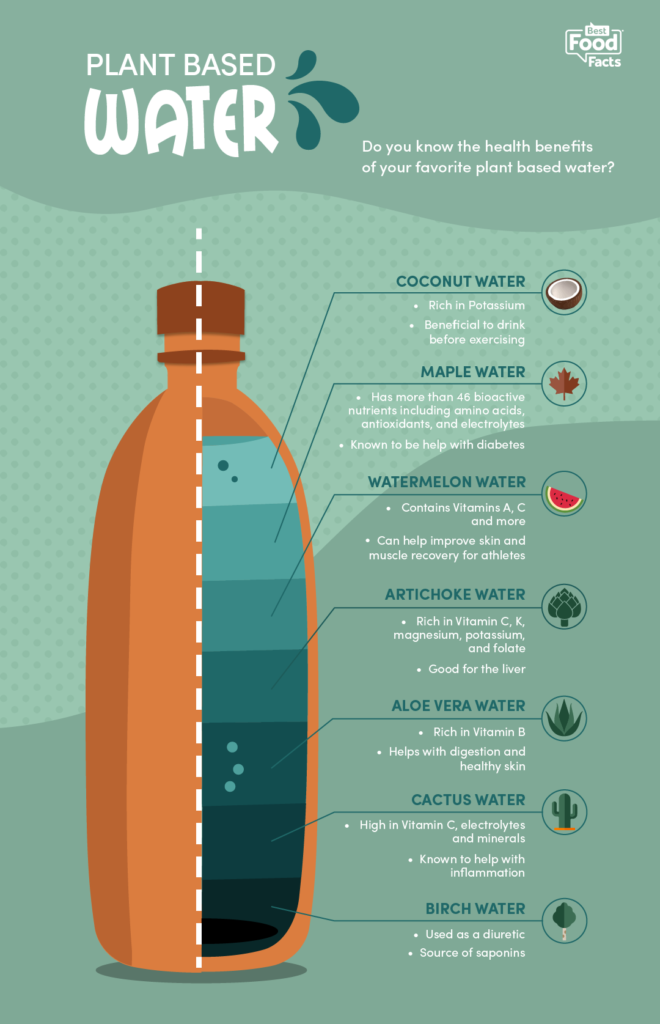
Plant Waters Offer Cool Alternative
08/15/2017
Move over, infused water, there’s a new trendy beverage –– plant-based waters. Also called alternative waters, these beverages may have properties to give you an extra boost. We talked with Danielle Hammond-Krueger MPH, RD, LD and Connie Diekman M.Ed., RD, CSSD, LD, FADA, FAND, to dive a little deeper into what these beverages really offer.
The drinks are produced from plants and the most popular are coconut water, birch water, aloe water, or maple waters, Hammond-Krueger said.
“Depending on the plant type, the water can be extracted or processed in many different ways. There is not a standard definition for plant waters and depending on how the product is labelled, it may or may not be regulated by FDA on nutrients and required labeling,” she said.
What are the health value to plant-based waters? Should I be drinking them?
Hammond-Krueger: “The health benefits of plant-based waters vary, and based on research literature, is very limited. Depending on the type of water and the additives, the nutrients and calories can vary. If you look at a few of the more popular waters, they might have small amounts of calcium, sodium, magnesium and potassium. However, based on the USDA Nutrient Database, the average amount of these nutrients in the waters are not considered a “good source” – meaning they do not provide 10 to 19 percent of the daily value for these nutrients.
While most plant-based waters are not harmful, one factor to consider is if the additional calories or nutrients are needed.
“If a person eats a balanced diet, they should not have a need for plant-based waters. Choosing water as the first form of hydration is the best option,” she said.
Are plant-based waters better than plain water?
Diekman: “Overall the answer is no, but if you enjoy the flavor of the plant-based waters and that allows you to drink the amount of fluid you need to be well-hydrated, then they are better choices for you.”
Why are these types of waters so popular?
Hammond-Krueger: “The popularity of plant-based waters has been increasing in the last few years. While many of the waters have been used in cultural regions, much of the popularity stems from sports and performance industry. These waters have been compared to electrolyte replacing sports drinks. However, many of the waters do not provide adequate electrolyte replacement. In fact, most people who participate in moderate or intense activity greater than 60 minutes do not need to replace electrolytes and water is efficient. Those individuals who are active greater than 60 minutes or in heat greater than 90 degrees may need electrolyte replacement.”
What do they taste like? Examples include coconut, aloe vera, cactus, maple, watermelon and artichoke.
Diekman: “I have not tried any except for coconut water and it has a nice, somewhat sweet taste. Given that the waters come from plants the taste likely reflects the food/plant so if you don’t like the taste of maple, you likely won’t like the water. They are similar in texture to water, since the goal is to offer an option to plain water, but the plant flavor can make palatability better – if you enjoy the plant food itself.”
Do you have any that you recommend more than others?
Hammond-Krueger: “Being informed and reading the nutrition facts label is important when determining whether or not a person should choose the water alternative. Look for water which does not claim any health benefit.”
According to the New York Daily News, here’s the down-low on some of the most popular plant-based waters:
- Coconut water – rich in potassium, popular to drink before exercising because of its ability to hydrate and replenish electrolytes.
- According to Alive, coconut water is a slightly sweet beverage that is found on the inside of young coconuts. It is portrayed as a good sports drink for athletes based on its electrolyte count, potassium, magnesium and more.
- Aloe vera water – rich in vitamin B and helps with digestion and skin .
- Known for its anti-inflammatory properties, this tart drink is said to be good to drink while you are participating in any outdoor activities. Early research states that it might be good for digestion and promotion of healthy cholesterol levels.
- Cactus water – high in vitamin C, electrolytes and minerals and helps with inflammation.
- With a slight berry flavor, cactus water has antioxidants including betalains (which are good for preventing some hangover symptoms). It is also believed to promote skin health and help with under-eye puffiness.
- Artichoke water – rich in vitamins C and K, magnesium, potassium and folate, good for the liver.
- Containing antioxidants and phytonutrients, artichoke water is a good source of fiber. It has also been known to have benefits on the liver based on its detoxifying potential.
- Maple water – has more than 46 bioactive nutrients including amino acids, antioxidants and electrolytes and can be good for diabetics.
- How is maple water made? By boiling to sap from maple trees and collecting the water than comes off of it. It is a low-calorie drink that is high in antioxidants.
- Watermelon water – has a lot of vitamins A and C, good for those who are looking to help with skin and muscle recovery for athletes
- Watermelon water is full of potassium, fiber and antioxidants, which could be linked to increased hydration (since watermelon is mostly water anyway). Possibly good for blood health, watermelon water is full of lycopene.
- Birch water – is a source of electrolytes, antioxidants and saponins and has been used as a diuretic.
- Said to be “the next coconut water,” birch water is full of electrolytes, xylitol and antioxidants. It has a hint of sweet and has been drank for centuries around Europe and China. It has also been portrayed as a good diuretic.
It is good to drink plenty of water, regardless of the source. If you’re looking to enhance plain water, plant-based waters might be a good option for you.




























